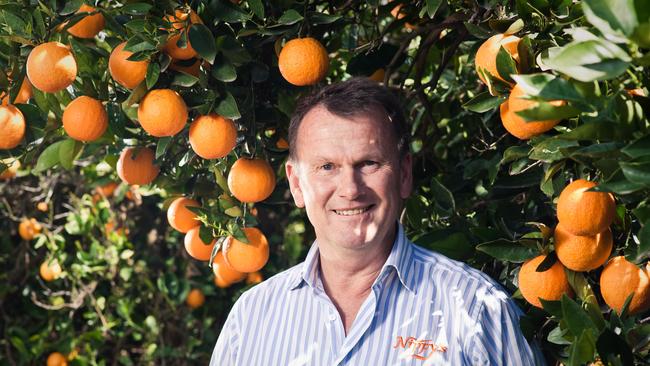One hundred per cent juice to be classed in the same category as some soft drinks
New health guidelines that will lump many fruit juices in with soft drinks will be more than the industry can bear, South Australian growers fear.
SA News
Don't miss out on the headlines from SA News. Followed categories will be added to My News.
- Murray Bridge abattoir rebuild poised to break ground
- Are you getting the most from your Advertiser subscription?
Fruit juice will soon be labelled as unhealthy as some soft drinks in a move one of South Australia’s most famous brands warns could be a final nail in the coffin for the industry.
Nippy’s managing director Jeff Knispel has raised fears that over-enthusiastic health advice could further tarnish the reputation of all fruit juices.
Proposed changes to the Health Star Rating (HSR) system, endorsed by the Federal Government despite protests from industry, will mean 100 per cent Australian juices, including those made from oranges and apples, will soon be rated the same as diet soft drinks.
The non-compulsory system has been used by an estimated 16,554 products in Australia, a five-year review has found.

The system is aimed at giving customers an “at-a-glance” overall health rating of packaged and processed foods.
Foods are rated from half a star to five stars, depending on how many “healthy nutrients” and “risk nutrients” they comprise. An endorsement by the Federal Government that is now expected to be adopted by Food Standards Australia, means fresh juice with no added sugar will fall from five stars, the healthiest rating possible alongside water, to as low as 2½ stars.
Mr Knispel whose family-owned company has been a household name in SA for 50 years, told the Sunday Mail the star rating would “put doubt in people’s minds” about the real health benefits of orange juice.
“There have been about two decades now of adverse publicity from groups about the (natural) sugar content in fruit juices, but the issue is that they look at total sugars rather than added cane sugar (commonly found in soft drinks),” he said.
“They have generally had their way with that argument and it has a detrimental affect on the citrus industry. This would be another nail in the coffin. If we go from our current rating down to a 2½-star rating, it would put additional doubt in people’s minds.”
He said the rating was also at odds with the Australian Dietary Guidelines (ADG), which places fresh juice in the “eat-more-of” category.
Citrus Australia CEO Nathan Hancock has warned the decision was a misrepresentation of the health benefits of fresh 100 per cent juice with no added sugar. He said it would have a detrimental effect on fresh juice consumption and the future of Australia’s juice industry.
MORE NEWS
Giant cuttlefish stoush as anglers get the green light
International vet crowned new King of Cabaret
“The algorithm that underpins the revised rating assesses fresh juice on sugar content alone and does not consider essential nutrients, such as vitamin C, potassium, folate and magnesium, or antioxidants,” he said.
But the pleas for leniency have fallen on deaf ears, with the Federal Government supporting the changes. The Commonwealth and New Zealand Ministerial Forum on Food Regulation, which decides whether to implement recommendations from a five year review in the star ratings, met last month. Forum chair Senator Richard Colbeck said the recommendation had been accepted “to better distinguish water, and drinks similar in nutritional profile, from drinks with a high sugar and energy content”.
“Fruit juices lower in sugar still score well under the revised calculation for non-dairy beverages,” he said.
Barker MP Tony Pasin last month wrote to Senator Colbeck raising concerns about the impact it would have on orchards in his electorate.
